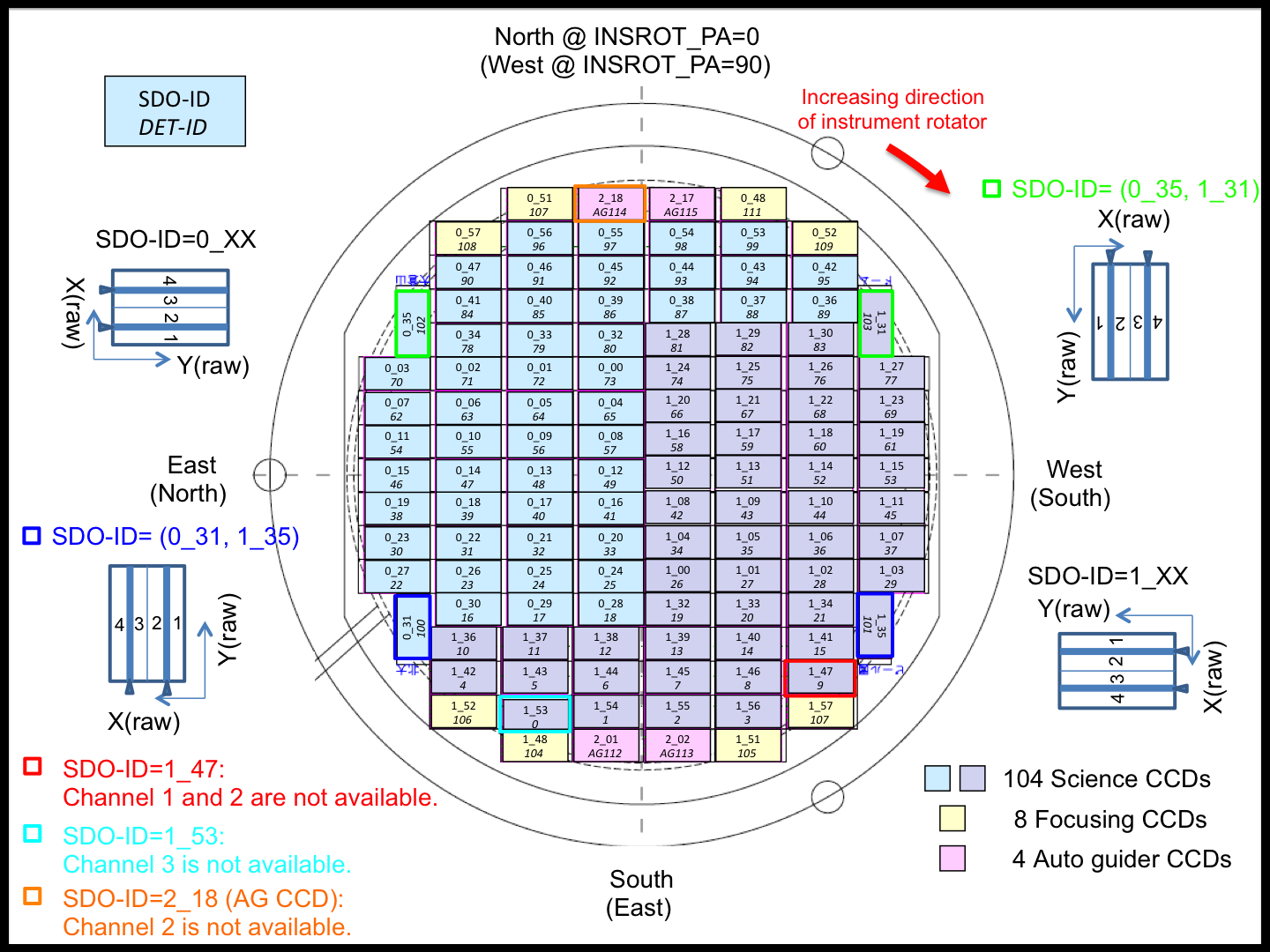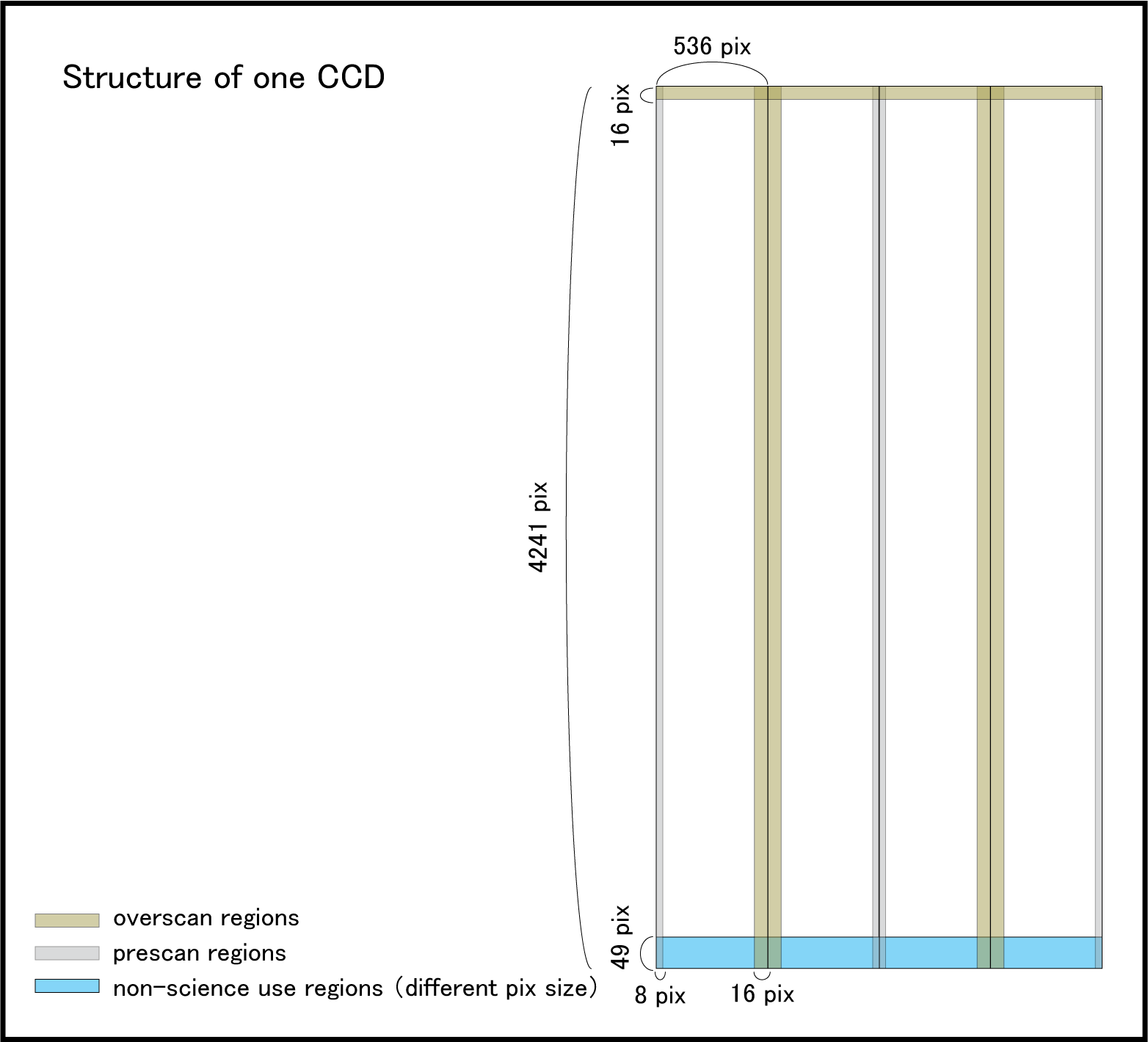Basic Information for Hyper Suprime-Cam¶
This page briefly introduces HSC itself. We only scope on information about HSC that is needed for data reduction. All detail information of HSC is found in here .
HSC filter¶
HSC has 5 broad-band filters (g-, r-, i-, z-, and Y-band) and 6 narrow-band filters (NB468, NB515, NB527, NB656, NB816, and NB921) as of August, 2015. Available filters for open use are presented at Call for proposal of Subaru telescope .

Fig 1: The transmission curves of 5 broad-band filters and 10 narrow-band filters (excerpting from HSC page on the Subaru telescope web site).
HSC CCDs¶
HSC has 116 CCDs consisted 104 CCDs for science use, 8 CCDs for focusing, and 4 CCDs for auto guider. Figure 2 shows the CCD arrangement of HSC. You are able to obtain 122 CCDs (104 CCDs for science use + 8 CCDs for focusing) per one shot.
Each CCD has two CCD IDs. One is used for raw data shown as SDO-ID in Figure 2 (details are written in hscdata). The other is used for the use in HSC pipeline shown as DET-ID.
It is worthy to understand the structure of a CCD itself. One CCD consists of 2144 × 4241 pix, and 4 CHs, where each CH has 536 x 4241 pix. All CHs have overscan regions, pre-scan regions and non-science use regions shown in Figure 3. Final pix size after detrending is 2048 × 4176 pix per one CCD.
Naming HSC data¶
HSC raw data is named as HSC+[A, B, C...]+%6d+%2d.fits. First, one alphabet comes after HSC. We use ‘A’ for now, but it will change to ‘B’, ‘C’ and so on. The ‘%6d’ is combination of even and odd, and represents a shot number. For example, raw data named HSCA123456+%2d.fits and HSCA123457+%2d.fits are taken in one shot. Especially, even ‘%6d’ is visit ID which is used in HSC pipeline. The ‘%2d’ expresses a CCD ID. The ID number from 00 to 57 is assigned to each CCD.
Figure 2 shows the CCD arrangement of HSC. The SDO-ID is CCD IDs for raw data. CCDs colored in cyan and purple denote CCDs with even and odd ‘%6d’ shot names, respectively. The double-digit number after under-bar on each CCD stands for a CCD ID of raw data.
For instance, you find a raw data named HSCA12300116.fits. Its a raw data of visit ID 123000 and CCD ID 58 (CCD ID of 58 is found about the center of HSC).
Data amount¶
Each pix of HSC raw data has a 16 bit integer, and one CCD of raw data is about 18 MB. Since there are 112 CCDs, the data amount per one shot is about 2 GB. Once you reduce HSC raw data, 32 bit integer is stored in each pix of reduced image data. Because a reduced image data also includes 32-bit image and 16-bit flag image, final data of each pix is 80 bit. We summarize information about data amount in the following table.
| Data | Amount |
|---|---|
| 1 CCD of raw data | 18 MB |
| 1 shot of raw data | 2 GB (112 CCDs) |
| 1 CCD of reduced data | 82 MB |
| 1 shot of reduced data | 11 GB (104 CCDs) |
| 1 CCD’s catalog | ~10MB - 30MB |
| 1 shot's catalog | 1-2 GB |
| 1 CCD (raw + reduced + catalog) | 100 MB |
| 1 shot (raw + reduced + catalog) | 13 GB |


